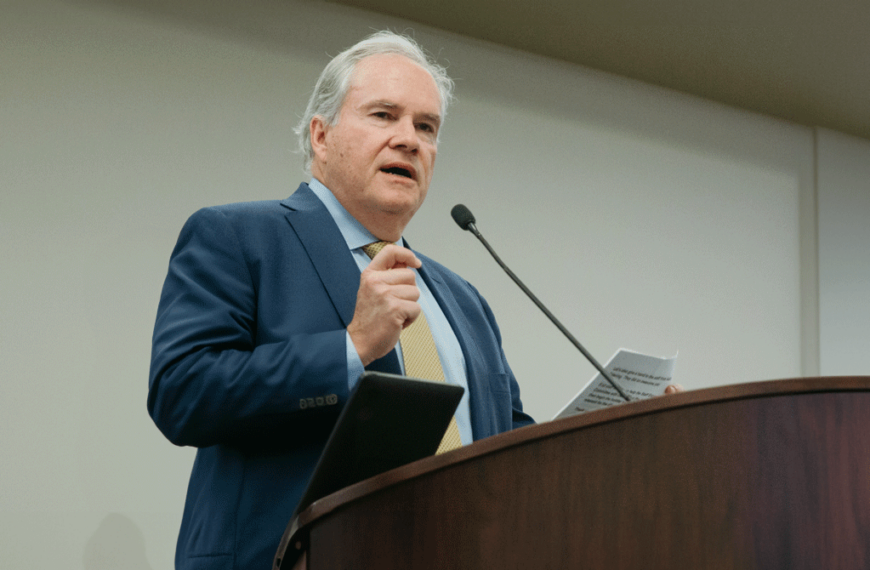When the Texas Hospital Association pushed for key steps to protect health care workers from violence during last year’s state legislative session, it was trying to reverse a long-standing pattern of troubling incidents driving nurses and others out of the profession – a regrettable status quo that had worsened since the COVID-19 pandemic.
But hand in hand with that aim was an accompanying ambition to change the culture surrounding incidents of workplace violence, notes Cameron Duncan, J.D., THA vice president of advocacy & public policy. Since the THA-driven passage of two major workplace violence laws, Duncan has spoken at sessions related to the new laws approximately seven times in the past several months.
Too often, he hears of the proverbial culture of silence surrounding assaults and threats in the health care setting.
“When I do speak, it’s frequently brought up by members of the audience that, ‘Well, we all know that workplace violence events are vastly underreported,’” Duncan told The Scope. “[We hear] things like that nurses have had this culture of, ‘Oh, it’s just part of the job.’
“And we want to break that cultural norm, and have it really be unacceptable at all levels.”
As the National Institutes of Health observes Workplace Violence Prevention Awareness Month during April, THA is keeping tabs on the impact and eventual full implementation of those two bills passed by the Texas Legislature – Senate Bills 240 and 840 – and hoping for further protections to come via promising legislation at the federal level.
Promoting Protection, Proper Punishment and Speaking Up
Hospital advocates made addressing workplace violence a priority during the 2023 session of the Texas Legislature because of its demonstrable impact on the ranks of the health care workforce – not just their everyday physical and emotional wellbeing, but also their willingness to continue putting themselves in harm’s way.
A late-2022 THA member survey showed 98% of hospitals had seen workplace violence worsen or stay the same since pandemic, with 61% reporting increased severity. And 64% reported their hospitals were operating with fewer beds and reduced services due to nurse staffing shortages.
Studies on a national level have shown both troubling reporting and estimated underreporting of hospital and general workplace violence. A 2019 survey by the American Nurses Association found one in four nurses reported being physically assaulted. In 2015, the American Journal of Industrial Medicine published a report finding that 39% of health care workers had experienced violence from patients or hospital visitors – but only 19% of those incidents were reported.
The passage of SB 240 by state Sen. Donna Campbell, MD (R-New Braunfels) and House sponsor Rep. Donna Howard (D-Austin) is geared in part toward closing that sizable gap between the number of incidents that take place and the number that are reported. The law requires hospitals and other health care facilities to implement a workplace violence prevention policy; maintain a workplace violence committee; and provide workplace violence training at least annually. Importantly, it also prohibits retaliation or discipline for reporting a violent incident in good faith. Hospitals have until Sept. 1 to fully implement the requirements of the bill.
The other major workplace-violence measure the Legislature passed in 2023, SB 840 by Sen. Royce West (D-Dallas), directly attacked the accountability side of the equation, enhancing the legal penalty for assaulting a hospital worker – anywhere on hospital property – to a third-degree felony.
These new laws, and other existing state and federal statutes addressing workplace violence policy, are explained in detail in THA’s and the Texas Nurses Association’s workplace violence prevention toolkit, released in December 2023. The toolkit includes legal analysis, technical information and sample signage for hospitals to notify visitors about the enhanced penalty for SB 840.
Work to Do: Federal Efforts
Entering another state legislative session in 2025, Duncan says THA plans to monitor the implementation and effectiveness of the multi-pronged SB 240 and see if any other legislative steps will be needed down the road.
“And then on SB 840 … I think more than anything it’s going to require a lot of community engagement with hospitals and their law enforcement agencies. That’s something that I’ve been speaking on quite a bit, the necessity of engaging with law enforcement,” Duncan said. “One, just making sure that law enforcement’s aware of the new bill. And two, having that relationship with law enforcement in general with the hospital is just really important for a variety of issues.”
SB 840, in fact, carries similarities to congressional legislation that could be the next major frontier of keeping hospital workers safe. The American Hospital Association notes that no federal law on the books protects health care workers from either workplace assault or intimidation. But the Safety from Violence for Healthcare Employees (SAVE) Act would provide similar protection to health care workers that legally exists for airport and aircraft workers. In part, the SAVE Act would make assaulting a hospital worker punishable by up to 10 years in prison, or up to 20 years for using a “deadly or dangerous weapon or inflict[ing] serious body injury.”
THA, AHA and many other hospital and medical organizations are supporting the SAVE Act, with Duncan characterizing its penalties for assault as an additional deterrent. With progress made in Austin, and more perhaps coming in Washington, D.C., he says it’s a great sign that “the conversation is happening over and over again, and it’s being led from the top level at hospitals.”
“Pretty much any of us who know a health care worker knows that they have a story about a violent incident that they’ve encountered in the care setting,” he said. “Hospitals are dedicated to preventing those from happening.”
Related articles from The Scope
Repeal of 2024 Cuts Are a Needed First Step to Protect Our Safety Net
Every piece of financial certainty our hospitals can get these days is appreciated – especially for the facilities that treat the most vulnerable Texans. For the rest of this year,…
Workplace Violence: Breaking a Cultural Norm
When the Texas Hospital Association pushed for key steps to protect health care workers from violence during last year’s state legislative session, it was trying to reverse a long-standing pattern…
How FQHCs Can Stay HRSA-Compliant
Health care compliance — adhering to rules, standards, policies, laws, and regulations related to medical practices — is about keeping operations running smoothly. It also promotes safe, high-quality care, and…
HOSPAC: Agents of Change
Out of all the ways the Texas Hospital Association pushes for better health care in Texas, HOSPAC – the only political action committee that represents all Texas hospitals – may…




